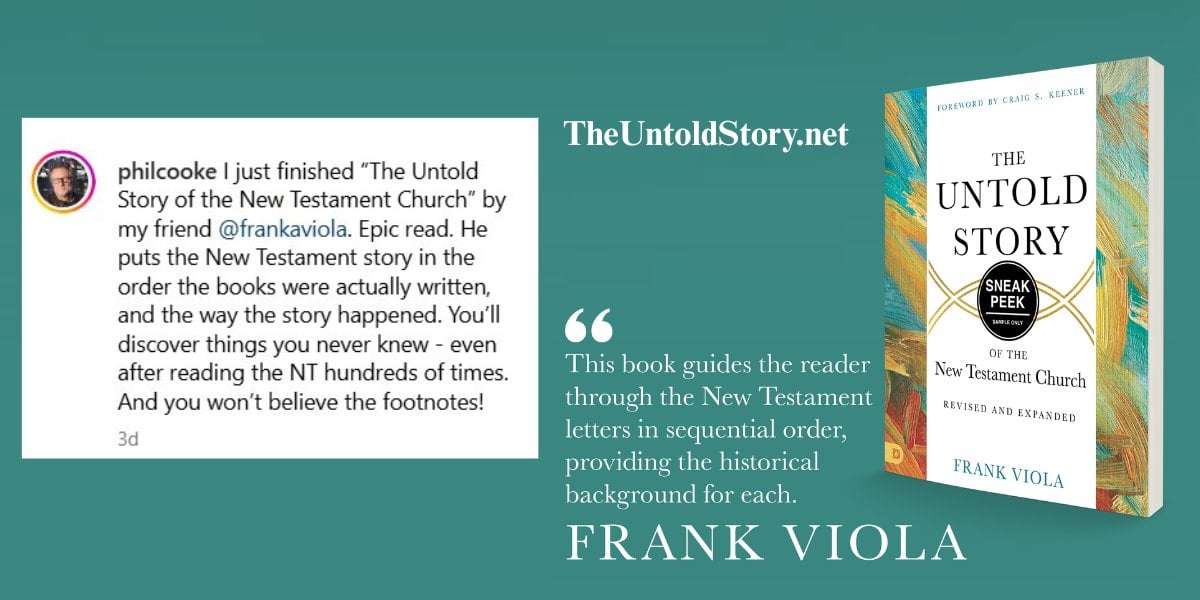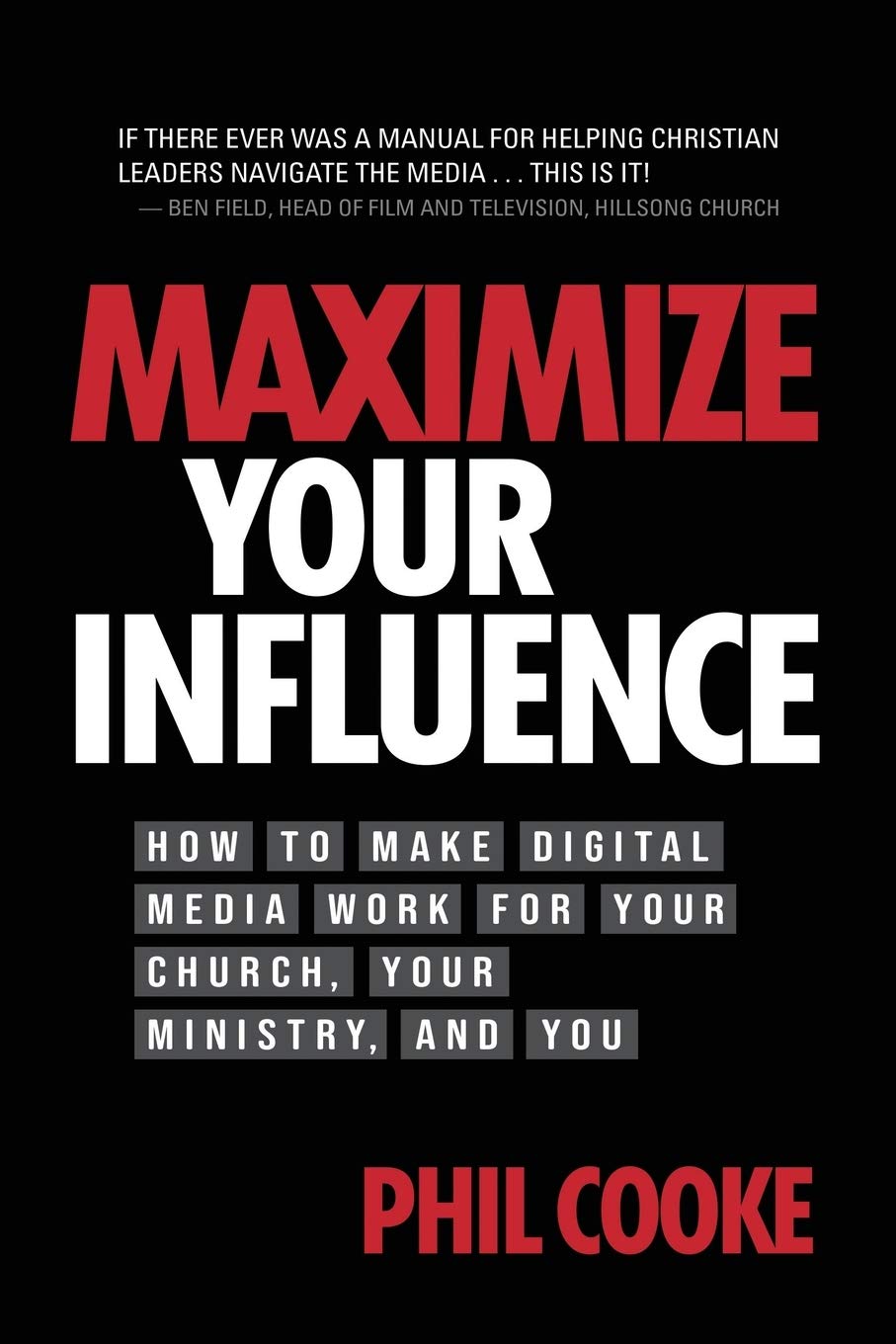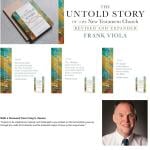Phil Cooke is the leading media expert in the world. He’s also a strong Christian. So I was honored when he wrote this about my new book recently (below).
Phil has written a slew of books, all of which are valuable. Recently, I caught up with Phil to discuss his recent book Maximize Your Influence: How to Make Digital Media Work for Your Church, Your Ministry, and You, which I highly recommend for every author, content-creator, and spiritual leader.
Enjoy!
1) In chapter 1, which is called Communication is a Two-Way Conversation, what do you say about the one-way street that marks many Christian authors? I’m speaking of pastors, teachers and authors who have put themselves into the status of a celebrity where they are inaccessible, even inaccessible to their peers. And yet their readers and followers don’t seem to care. They don’t even seem to notice. This has always perplexed me. What say you?
Most of us grew up in a world of one-way communication. Think of traditional TV, radio, preaching, etc. There was no way to respond or talk back. Obviously, there were popular individuals in that world, but today we’re seeing a dramatic shift.
For instance, when I talk to major social media influencers in Hollywood, I often hear that they never post on social media unless they have time to reply to the people who respond to their posts. That’s probably why they have millions of followers. They allow people to engage in a two-way conversation with them.
2) In that same section, you talk about how the Internet has created an illusion of intimacy. Please explain that.
I’ve had times at my company when I was traveling, and someone came to our office demanding to see me because we were “friends.” In every case, they followed me on social media and assumed that meant friendship. We’re seeing that the Internet and social media have increasingly become the kind of connection that used to happen only face-to-face.
3) In chapter 6, you discuss marketing communication and websites. What are the key Ingredients to a great website for an author or content creator?
Websites for anyone should focus on action. What action do you want a viewer to take? This generation wants to check things out online before they show up or participate. So, in that world, your website could be the turning point for them to make a decision.
4) I’ve noticed that many authors think that they have to build their social media presence in order to sell their books. You have a whole section on whether or not social media translates into book sales. I have my own experience and views on this, but please share your own from the book and even beyond it.
Many things translate into book sales, and social media is becoming increasingly important. Obviously, there are bestselling authors without a social media presence, but I want every tool at my disposal when it comes to sharing my message with the world.
5) Talk about what eBooks are good for and what they are not good for.
When eBooks were invented, book sales on those platforms skyrocketed. But it didn’t take long for them to flatten out and then fall behind print books again. In my case, I have a Kindle and an iPad for trips, but they are primarily full of casual reading and detective novels. If I’m reading something serious like your new book, “The Untold Story of the New Testament Church,” then I want a print copy. I’m a serial underliner and notetaker.
6) You’ve been published by some of the major publishing houses in the world, but you have also self-published. Talk about the differences and your conclusions.
The publishing business is going through the exact change the music business did 15-20 years ago. Today, publishers aren’t interested in risk. They want you to bring vast numbers of followers to the table, and essentially, do all the marketing.
So I decided that if I’m going to do the marketing, why should I receive just a $1.25 royalty per book? If I’m willing to risk the publishing cost, I can make as much as $10 per book, particularly at live events. Plus, I control everything and own all the rights. It’s certainly more expensive, but I see minimal upside to traditional publishing these days.
7) You have a chapter about working with consultants. How does an author find a really good consultant?
Ask around. The best consultants and coaches live and die by results. Reach out to people you admire and ask about their experience and recommendations. I would never engage any consultant who doesn’t have a solid track record.
8) Related to the above, how does an author find a really good publicist who doesn’t charge an arm and a leg, but who gets results?
That’s another risk. There are no guarantees, so checking results and asking their clients is best. However, it’s also important to remember that the best results come when you help them. Pull potential op-ed pieces from your book, be available at all time zones for media interviews, and share your network and contacts with them. But remember, if you’re a relative unknown, a publicist will have a tough job pitching you to the media.
9) If an author wants to self-publish their book, and they want to sell it outside of vendors like Amazon (for various reasons), with respect to the shipping of that book and taking orders, can you recommend services that do this?
Those are called “fulfillment houses.” They can take phone or online orders, pack the books, and ship them to customers. There are various companies like that, and the right choice depends on the book you’re selling, your goals, and your budget.
10) You talk about the Christian attack culture, which is probably worse today than ever. With the advent of social media, Jordan Peterson calls people who attack others online “reputation savagers.” He’s not talking about making the crimes of a person who was convicted in a court of law public, but to the spreading of gossip and rumor and false accusations to smear a person. Such people even exist in the “Christian” community. And unfortunately, for many Christians, it’s “shoot first, ask questions later” which is a sinful posture. Do you see this Christian attack culture (as you call it) ever getting better?
Not at all – it’s getting worse. Primarily because in the Christian community, armchair “experts” call themselves “investigative reporters,” or position themselves as being “heresy hunters,” But in most cases, they’re obsessed with clicks, and controversy gets clicks.
There’s no question that lawbreakers and abusers need to be reported, but I worry that too many amateurs think of themselves as theology cops. It doesn’t take much to tear down a house, but it takes expertise, commitment, hard work, and drive to build one.
11) You have a section on dealing with online trolls. Talk about the importance of ignoring trolls and refusing to read what they write.
Trolls are simply people who try to become famous by attacking others, and they are usually relentless. I know it hurts to have some idiot trash your name and reputation without merit, but they don’t really care about the truth; they just have a grudge. You won’t change their minds, so why even get involved?
12) We know that one of the keys for a book to be successful is that it has to be remarkable. Meaning, it’s so unique and so different that readers can’t help but remark about it. But how do we process a book that IS remarkable yet word isn’t spreading. Readers are sending notes and reviews to the author about how unique and remarkable the book is, but most of them are not spreading enthusiastic recommendations to their friends to get the book. They are stopping with notes to the author and public book review sites.
How do we make sense of this?
We used to live in a reading culture. Think of the 60’s when major magazines had hundreds of thousands of subscribers, and people really cared about new books. But today, we live in a culture of abundance, but not always in a good way. In the 1960’s, 20,000-40,000 books were published a year.
Today, more than 1 million new books are published every year. We’re simply being overwhelmed with choice. One British study indicates that the average person sees about 10,000 media messages every day – which means that today, attention is the new currency. If you can’t capture people’s attention, you’ve failed.
—
Order your copy of Maximize Your Influence: How to Make Digital Media Work for Your Church, Your Ministry, and You.
Go here to read my other interview with Phil – The Way Back.














